The system of co-ownership in Japan
DOI:
https://doi.org/10.21638/spbu14.2021.208Abstract
The system of co-ownership in civil law affects various legal relationships, such as property partnerships and co-heirs. This article introduces the general rules of the co-ownership system in the Japanese Civil Code and explains how they are applied in harmony with the regulations concerning property partnerships and co-heirs. In particular, it deals with changes to regulations concerning partnership property and co-inherited property via a recent amendment of the law of obligations and law of inheritance. There is a debate about whether partnership property is shared jointly or collectively by the partners. This article, according to the basic numerus clausus principle in the Pandekten system, suggests that collective ownership should be stipulated in part on real rights and the premise that the provisions of partnership property under the Japanese Civil Code refer to regulations reflecting the collective binding of the German Civil Code. Despite the premise that co-inherited property is shared jointly by each co-heir, some conflicts have arisen regarding the disposition of shares of co-owned things and requests for refunds of deposits by partial heirs before a formal division of inheritance. The revised civil code established new provisions to resolve these issues. However, defining “joint ownership” in terms of statutory shares is taken as a basic rule while the specific portion of co-heirs has not been determined, as noted in the article, and it results in an unfair distribution of inherited property.
Keywords:
revision of Japanese civil code, co-ownership, joint ownership, collective ownership, partnership, co-inherited properties
Downloads
References
Downloads
Published
How to Cite
Issue
Section
License
Articles of "Vestnik of Saint Petersburg University. Law" are open access distributed under the terms of the License Agreement with Saint Petersburg State University, which permits to the authors unrestricted distribution and self-archiving free of charge.






